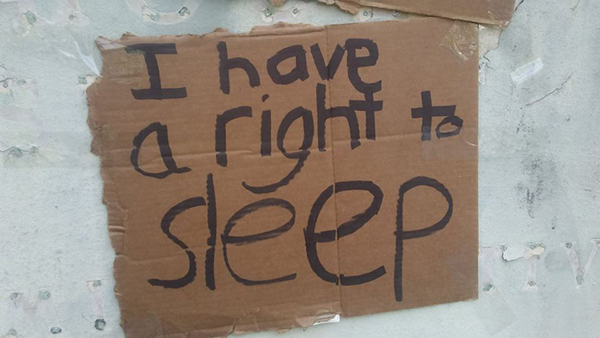This is a letter that I sent to Jay Caspian Kang, opinion writer for the New York Times, who sends out a newsletter, often about homelessness in Berkeley. I understand that this new way of dealing with getting homeless to vacate where they have found safety was sponsored by Kate Harrison and Lori Droste [Berkeley City Council members] as a new use of the Notice of Violation Blight. It is a new low. — Maria Poole

Photo / Sarah Menefee
Dear Mr. Kang:
I have been following many of your opinion pieces on homelessness and particularly liked your latest. Something must be done to stop the way the unhoused are cruelly treated and often abandoned.
I live very close to People’s Park in Berkeley, in an apartment house that was built in 1907. It had 11 apartments and two large commercial spaces that occupied the ground floor. In 2012 it was purchased by an LLC and now only three rent-controlled apartments are occupied. The whole downstairs, where the stores were, and the other apartments, as they became unoccupied, were gutted.
This scenario has played out all over Berkeley. Old apartment houses have been purchased by LLCs, foreign investors, speculators or developers, and have been allowed to deteriorate or have been left unoccupied or minimally occupied. We, in our building, have had ceilings crumble over us, water damage our belongings in closets, electrical shorts obliterate electronic equipment — you name it. We are all elderly or disabled, have lived here for 30 years and can’t afford to move due to the expense. We also know that if we left here, we might join the homeless.
The tenants here allowed a homeless woman, who was disabled and alone, to encamp in a sheltered unused doorway of our apartment house, on the residential street, for two years. We notified the landlord about a month after she was here and he agreed, with the provision that she make herself portable, so that the empty downstairs could be accessed, if needed. Various neighbors, students, clinic personnel, etc., became friends with her and made her little encampment more secure. The City never placed her in housing.
About a week ago, the landlord of this building received a Notice of Violation Blight from the City of Berkeley and was told that he had two weeks from the date of the letter to remove the tent, tarp, wooden pallet, chair and a few small objects from in front of the apartment house. If he did not do so, fines would be levied against him and possibly a lien on the property. The woman who lived basically on the street, took down everything a couple of days ago and left the premise, so as to not put the landlord in an untenable position.
Berkeley has a policy where they give notice to an unhoused person before attempting to remove them and their possessions. They also have to offer the person an alternative place to stay. It is up to the person to accept or decline. This new use of the Notice of Violation Blight, skirts the policy of noticing and offering alternatives to the person. The City puts the pressure on the owner of the property via fines and liens and they do not have to properly notice or offer alternative housing to the person displaced.
I find this skirting of procedural protections for the unhoused underhanded. You end up with a middle age woman living alone on the streets, sidewalks, parks, or underpasses, and the City has achieved their objective. The person, however, has no housing or safety, but we now have a doorway to nowhere that is available.
Marcia Poole is an artist, organizer and advocate who has participated in and supported many of these homeless-led actions in Berkeley and beyond.
